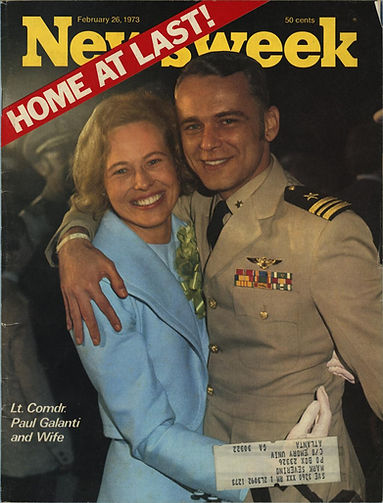%20https___www_virginiahistory_org_exhib.jpg)
Warrior Wives
How the Wives of Vietnam POWs Took Matters into Their Own Hands
Meet Jane Denton, Sybil Stockdale, Louise Mulligan, Andrea Rander, Phyllis Galanti and Helene Knapp – the band of the boldest, most badass 1960s women who took on the complacency of US diplomacy and brought their men home from the harrowing jungles of communistic Vietnam.
The Visit
April 24th, 1967 was the very day that would forever change the life of Helene Knapp. When the iconic blue, US military official car pulled into her driveway and the Air Force colonel rang her doorbell, her stomach sank to its deepest recesses. Helene knew about this stomach-sinking scene all too well. For any mother, wife, or sister with a son, husband, or brother serving active duty, this is the most dreaded doorbell ring of all. That afternoon, Helene learned her husband, Air Force pilot Major Herman Knapp, had been shot down over Vietnam while fighting in the American air war against Northern Vietnamese communists. The colonel bearing the bad news conceded the US was unable to confirm her husband’s fate and was classified as MIA (Missing in Action). Helene was then ordered to keep her gut wrenching situation a secret, save for close family members and absolutely no one else. This supposedly ensured her husband’s safety and survival.

How could the government demand – and expect – such blatant nonsense? Knapp was having none of it.
Adopted from the template diplomacy implemented during previous wars, Lyndon B. Johnson agreed to uphold this absurd “hush-hush” policy for fear of the unspeakable – the men being viciously treated - or worse – executed. It was commonly referred to as “quiet diplomacy” in a far-fetched attempt to reason with the radical Vietnamese. But, the seemingly prudent approach proved futile, as it allowed the Vietnamese to evade an accurate accounting of missing or captured American servicemen.
Defiant Dames
After months of coding covert letters to their imprisoned husbands and receiving replies depicting their disquieting ordeal, these POW wives willingly turned in their “1960s well-behaved, military wifey” cards and assumed their own operation rescue efforts. STAT.
The women intended to use the global media stage to ultimately “shame” Northern Vietnam into compliance and release the men. One must take into consideration, this was prior to the advent of cyber-based technology, so the women had their work cut out for them in terms of reaching a large-scale audience swiftly and effectively. But, they tirelessly forged on. Against government orders, Sybil Stockdale, wife of the highest-ranking naval POW Jim Stockdale, went brazenly public with her husband’s horrific captivity in October 1968. And, the National League of Families of American Prisoners and MIAs in Southeast Asia was incorporated in D.C. on May 28, 1970.
The female-founded organization employed savvy, progressive media initiatives, such as speaking with anti-war activists, creating bumper stickers, employing letter-writing campaigns, conducting public speeches, and television appearances to take their tale to the world. They made noise – and a lot of it. They managed to do what then-Secretary of Defense Robert McNamara couldn’t – put the extremist Northern Vietnamese regime on blast. The ladies brilliantly disseminated awareness on the international stage by exposing the customary, ongoing atrocities committed in the Hanoi prison camps as being in direct violation of the Geneva
Conventions of War.
%20https___www_virginiahistory_org_exhib.jpg)

Then, something miraculous happened. The world listened, most notably the US government. Within months, the men were released and came home, unbeknownst their crusaders were their very own wives. Now, that’s a special kind of love story!
When Richard Nixon was elected President of the United States in 1968, the new Secretary of Defense Melvin Laird insisted the US government finally abolish the insufferably inept “keep quiet” policy and allow other POW/MIA families to come forward and tell their stories. Eventually, Nixon came to realize the indispensable, international public relations value the women had provided, prompting an unprecedented unification in America, specifically of the bipartisan variety. This was a movement everyone could get behind.
In Retrospect
In a 2016 Time interview when Arizona state senator John McCain was asked if the POW wives “going public” tactic had made any significantly positive impact on the treatment of wartime POWs, he eloquently noted, “Our treatment changed drastically. It went from bad – in my case, solitary confinement to being with 25 others…It was not gradual…Some of us may not have been alive had it not been for that change in treatment.” Like Eleanor Roosevelt so famously quoted, “Women are like tea bags. You don’t know how strong they are until you put them in hot water.”
You can learn more about the indomitable spirits of these fearless females and their
unforgettable story by picking up a copy of The League of Wives: The Untold Story of the
Women Who Took on the US Government to Bring Their Husbands Home by Heath Hardage
Lee.
